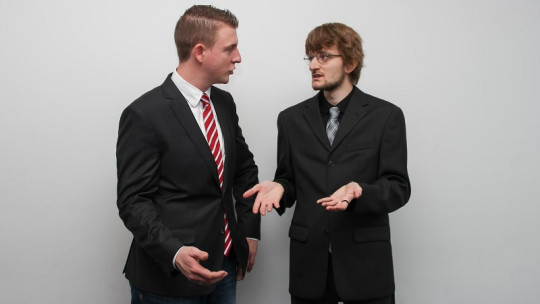
How to know if toxic people are damaging your mental health The way we relate to our environment has a direct impact on our mental health, which is why it is so important to establish healthy and adaptive interpersonal relationships.
When a relationship does not meet the most basic requirements of coexistence and affects each of its members or a single party in one way or another, we say that we are facing a toxic relationship.
Next We will briefly see what toxic relationships consist of and we will see how these types of relationships can harm mental health of people.
What are toxic relationships?
Toxic relationships are those in which, voluntarily or not, damage to one of the parties or to both people who make up the relationship and that also generate a “vicious circle” effect that gives them continuity by repeating actions that are harmful to one or both members over and over again.
People who are immersed in a toxic relationship, which can be a friendship, relationship, family or work, often experience feelings of anguish, suffering, anxiety or stress due to the effect and dynamics of the relationship.
There are many types of toxic relationships, the most frequent and recognizable are toxic relationships within a couple, but there are also toxic relationships between friends or families that are much more difficult to detect.
Since people are different and no one is the same as another, These types of relationships usually have a great impact on the mental health of the victim through alterations that can be greater or better depending on their personality and the personal psychological strategies that each person has to face adversity.

How to know if a toxic relationship is damaging your mental health
Some toxic relationships can truly affect people’s mental health. Here we briefly present the main sources of psychological affectation of this type of relationships.
1. You seek constant acceptance from that person
Constantly seeking acceptance from that particular person is usually a sign of emotional dependence, a phenomenon on which many toxic relationships, both as a couple and with friends and family, are based.
People who develop emotional dependence on another person They tend to believe that their happiness is necessarily linked to the other and that they will never be able to be happy or achieve anything if it is not with that particular person.
In this type of dependency relationship, there is usually a dominant person who is the one who progressively causes the other party to be increasingly dependent on their acceptance, affection or love, a negative and very toxic dynamic.
2. You feel afraid of that person
The fear that one person feels towards the other is one of the essential keys with which toxic relationships can be identified.
When a relationship is based on fear and one of the people is motivated by the avoidance of certain reactions on the part of the other, In the long run that will significantly damage the mental health of those who maintain a submissive attitude
This fear can be inspired by many reasons: for example, there may be the fear that our partner will get angry about something we do and leave us, for fear of being mistreated or for fear that they will stop loving us.
3. You avoid conflicts with that person
Avoiding any type of conflict with that person at all costs can also be considered an unequivocal sign of a toxic relationship; It is normal for healthy relationships to have disagreements and arguments from time to time given that both members of the relationship continue to maintain a certain level of autonomy and their own interests.
Making every effort not to argue or have conflicts with that person for fear that they will get angry or abandon us is one of the classic dynamics that characterize toxic relationships.
This fear generally ends up causing, as indicated, the person who feels it to end up giving in to everything and agreeing to any of the requests or demands that the dominant person has, to avoid any type of discussion.
4. Your self-esteem drops considerably
In toxic relationships, it is common for one of the people to end up developing low self-esteem by regularly dealing with a person who undermines their self-concept or makes them feel bad. This psychological phenomenon may not often be easily identified, but once identified, it is one of the most reliable proofs that we are facing a toxic relationship.
Toxic people usually end up eroding the self-esteem of the person they want to dominate so that their excesses and abuses are overlooked or even a bond of dependency is generated.
5. You feel like it distances you from your social circle
Removing the victim from their social circle is another of the classic characteristics that occur in toxic relationships by toxic people who are part of them.
This social circle includes both friends and close family members and when there is a toxic relationship involved, a progressive conscious and active deterioration of that bond occurs. to isolate the person who is being manipulated
6. You normally assume attempts to control yourself
Attempts at permanent control and jealousy become an everyday element in toxic relationships, to the point that no one questions them. This causes the bond to deteriorate quickly, because you enter a vicious circle of control and manipulation by not putting a stop to it.
The tendency to monitor what the other person does all the time, investigate their social relationships and even their mobile devices and social networks, is an unquestionable sign of a toxic relationship between two people.
7. You blame yourself for the abuse and disrespect you suffer
Abuse and disrespect in a relationship generate great discomfort and suffering in the person who suffers from them, and a subsequent impact on their mental and psychological health. Now, in established toxic relationships, It is common to blame oneself for suffering from that victim role
There are many types of abuse and disrespect in toxic relationships, from humiliation and constant mockery to more serious ones such as sexual abuse and sexual assault.
Are you looking for psychological assistance services?
If you want professional psychological assistance, contact me.
My name is Thomas Saint Cecilia and I specialize in intervention from the cognitive-behavioral model. I can help you in person or online.








